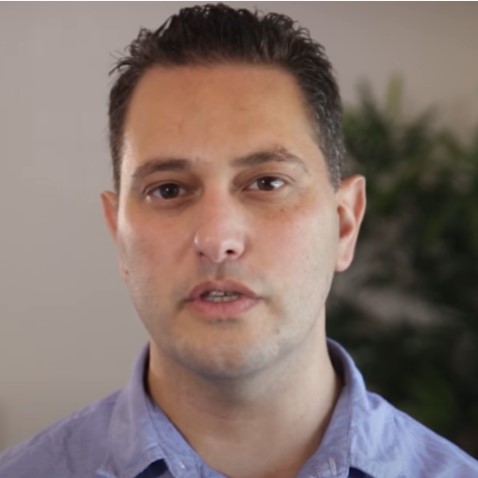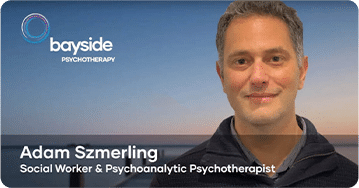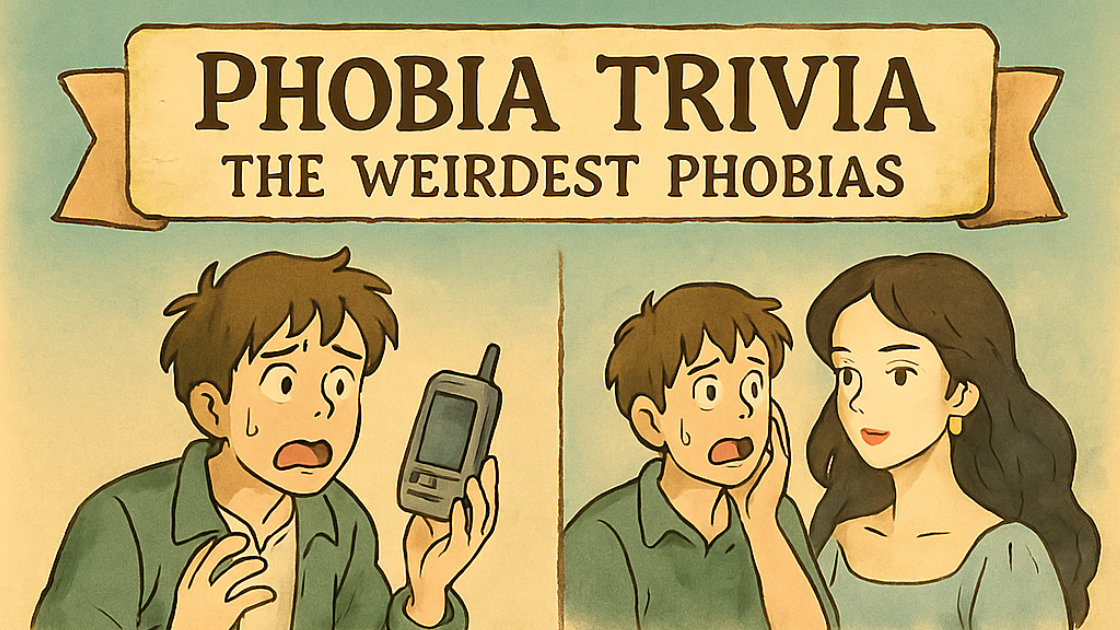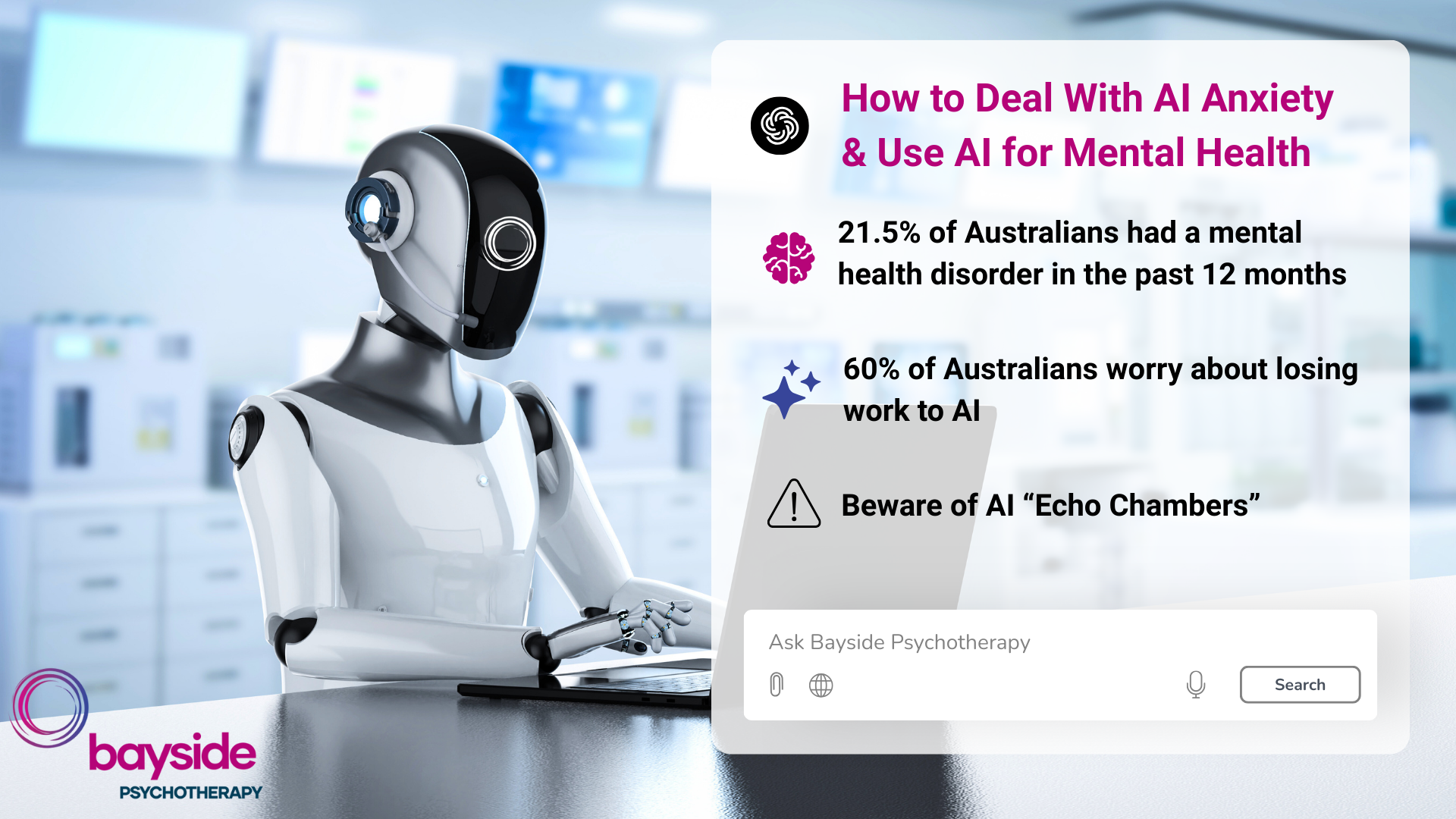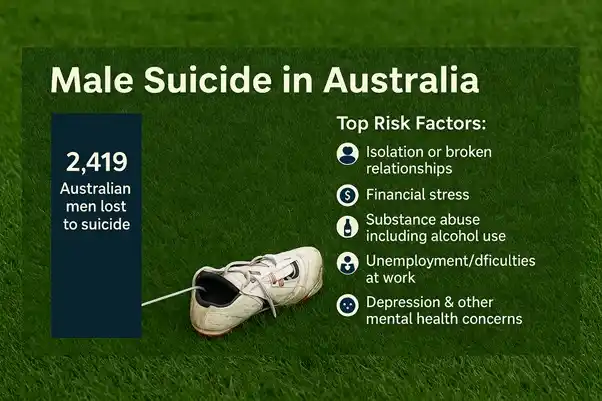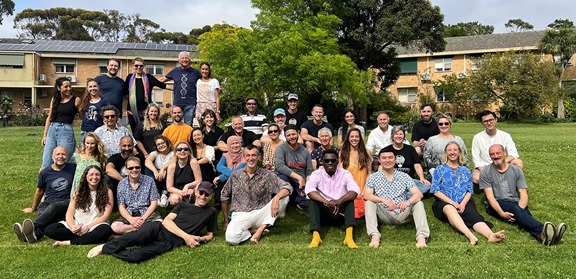The Dark Side of Social Media: How Misinformation is Wrecking Our Mental Health
Ever find yourself scrolling mindlessly on your phone, only to realise the hours have slipped away? You’re not alone. For many of us, our phones have become a digital black hole, sucking away hours of our lives without us even noticing. In fact, the average Australian spends just over six hours each day online, with nearly two of these hours dedicated to social media. It’s a habit that can, unfortunately, take a toll on our mental health.
Social media is a big part of daily life for millions of people worldwide. Platforms like Facebook, Instagram, Twitter, and TikTok surround us– offering a constant stream of information, entertainment and social interaction. With over 4.89 billion people using these platforms globally, the number is only expected to grow.
But what do we know about the relationship between social media and mental health? One of the biggest concerns is that the digital world can lead us down a rabbit hole of misinformation, causing fear and confusion, taking a toll on our mental wellbeing. Let’s look closer at the impact of misinformation on social media and mental health and offer helpful ways to navigate the digital world more mindfully, so that you can get back to reconnecting with real life. By using social media more wisely, we can still harness its benefits while mitigating its potential harms, creating a healthier, online space for everyone.
Some examples of the ill effects of social media:
Social media platforms are not just avenues for connection and information; they also harbour dangerous misinformation that can impact one’s mental and physical well-being.
- Health Myths:
Social media is abundant with information on fitness, nutrition and health. While some of this advice may be beneficial, a lot of it isn’t. Content creators often share wild health hacks that tend to make waves in the social media world, but don’t impress the experts.
From the frozen honey fad to influencer #WhatIEatinaDay posts. These trends can be downright silly to more serious – sometimes even promoting disordered eating. Another alarming trend has seen users suggest social media as a replacement for a real therapist. This is not only often ineffective, but dangerous.
- Scary Social Media Trends:
Trends can spread like wildfire on social media. While some may be harmless, others go beyond simple entertainment. Take the Blue Whale Challenge for example, which was aimed primarily at teenagers. To complete the challenge, users had to complete 50 tasks over 50 days, with each stage more sinister than the last. The final stage was reportedly linked to hundreds of suicides.
Another bizarre trend involved the odd act of inserting garlic cloves into one’s nostrils to purportedly treat ailments, including sinus infections and respiratory issues. This advice was not backed by science and actually increased the risk of infections.
- Cyberbullying
Cyberbullying is a big issue in Australia and globally. Here, 44% of young people report having a negative online experience, with 15% receiving threats or abuse.
Cyberbullying can come in many forms. It can involve hurtful messages, sharing private photos, exclusion or being tricked by fake accounts. Sadly, cyberbullying results in at least three suicides per week amongst young people in Australia.
- Unrealistic Comparisons
How often do you scroll through Instagram or other social media feeds comparing your lifestyle to others? Constant exposure to unrealistic standards of beauty, lifestyles, and success can trigger body image concerns, self-esteem issues and even depression. The pressure to present a perfect image online can lead to anxiety and feelings of inadequacy.
Studies showed that Australian females tended to compare themselves more negatively to others on social media than did males. The study also suggested that clinical interventions for those with problematic social media use may also reduce negative psychological outcomes such as depression.
While social media has many benefits, it’s essential to recognise the dangers – especially when it comes to health-related misinformation. Encouraging critical thinking, verifying information and advocating for digital literacy could reduce the negative psychological outcomes related to social media and mental health.
Study: Misleading Health Information on Social Media
A recent TikTok study found that approximately 44% of videos on sinusitis contained inaccurate or misleading content.
Non-medical influencers created and shared false information on the issue. While influential in their respective niches, these influencers lacked the medical expertise to provide accurate health advice. The included remedies and treatments not scientifically proven or endorsed by medical professionals.
There are substantial risks associated with sourcing health advice from unverified content on social media platforms. Moreover, the virality of misleading information can contribute to widespread misconceptions and undermine public trust in credible healthcare sources.
This highlights the need for social media platforms to implement stricter guidelines on social media platforms and the importance of seeking information from reliable sources.
More Examples of Harmful Misinformation Incorrect information on social media is a growing concern with significant impacts on mental health. Here are additional examples of harmful misinformation trends and their psychological impacts:
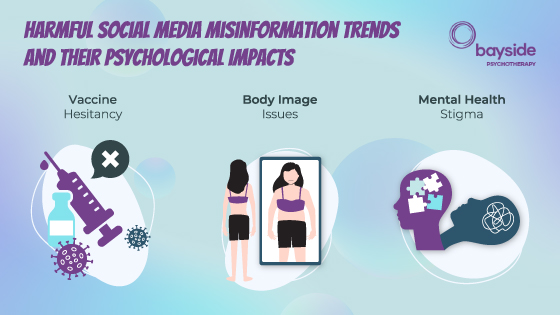
- Vaccine Hesitancy: False claims about COVID-19, including conspiracy theories about its origins or the effectiveness of vaccines, lead to increased anxiety, fear and confusion among individuals. This misinformation also contributed to vaccine hesitancy, impacting public health efforts.
- Body Image Issues: Social media platforms often portray unrealistic body standards, leading to body image issues, low self-esteem, and eating disorders. Misinformation related to dieting trends, beauty standards and body positivity can further exacerbate these problems.
- Mental Health Stigma: Misinformation surrounding mental health, such as downplaying the severity of mental illnesses or promoting harmful coping mechanisms, can perpetuate stigma and prevent individuals from seeking professional help. This can worsen mental health outcomes and lead to increased isolation and distress.
How does social media affect mental health?
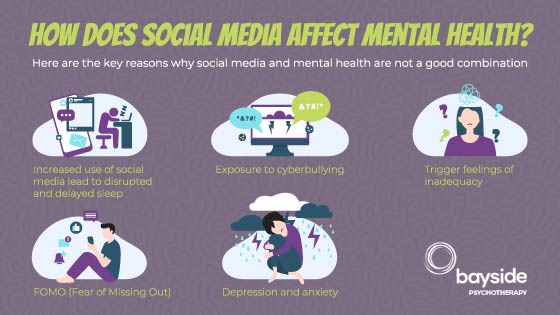
Here are some key reasons why social media and mental health, can be a poor combination:
- Disrupted Sleep and Social Media
A 2018 British study linked social media use to poor sleeping patterns which is associated with depression, memory loss and poor academic performance.
Constantly engaging with social media (and other online content), especially before bedtime, can delay and disrupt sleep. The blue light emitted by screens suppresses melatonin production, a hormone that regulates sleep. This interference with the body’s natural sleep-wake cycle can affect restorative sleep, ultimately impacting overall mental health.
- Exposure to cyberbullying:
Social media platforms are not immune to the negative aspects of human interaction, with cyberbullying being a significant concern. Cyberbullying involves using digital platforms to harass, intimidate, or belittle others, often anonymously. This can lead to increased stress, anxiety, and even depression among victims. Research from the ACCC Digital Inquiry indicates, Cyberbullying is the cause of up to 10 suicides per week in Australia and 8.8 million Australians have experienced some form of online harassment.
- Trigger feelings of inadequacy:
Social media is a curated space where individuals often showcase the highlights of their lives, creating a perception of perfection. Think of the phrase, Instagram vs Reality. This carefully selected and edited content can trigger feelings of inadequacy in others and low self-esteem. The constant exposure to idealised images and lifestyles can contribute to a negative self-image and mental health issues.
- FOMO (Fear of Missing Out):
Social media platforms thrive on updates, trends and real-time sharing of experiences. This constant stream of information can amplify FOMO, a feeling of anxiety or apprehension about missing out on rewarding experiences others are having. FOMO can lead to compulsive checking of social media, heightened stress levels and an overall sense of discontentment with one’s own life.
- Depression and anxiety:
The cumulative effect of disrupted sleep, cyberbullying, feelings of inadequacy and FOMO can contribute to the development of depression and anxiety. Prolonged exposure to social media’s negative aspects can increase stress levels, affect self-esteem, and disrupt emotional stability. Studies have shown that excessive exposure to idealised images and lifestyles on platforms like Instagram can foster a sense of dissatisfaction with one’s own life.
So, how can one mitigate risk and become a more mindful social media user?
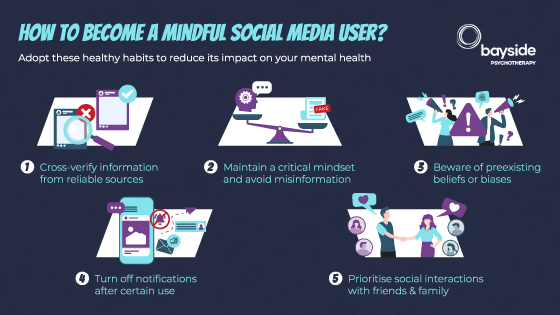
Understanding the challenges and adopting healthy practices is vital to enhancing one’s use of social media and mental health.
- Cross-verify information:
Always verify information from reliable sources before believing or sharing it. Remember the importance of fact-checking and critical thinking to combat the spread of false or misleading content. Instead of following an influencer’s advice on how to lose weight, for example, check-in with a nutritionist or similar health professional first who can help you approach it in a healthy way. - Maintain a critical mindset:
Approach social media content critically. Don’t take everything as truth – no matter how convincing it may seem. Question the credibility of the content and its sources. Understand the significance of reputable sources, expert opinions and fact-based information when forming opinions. - Be aware of confirmation bias:
Many of us are susceptible to confirmation bias. Confirmation bias is the tendency to interpret information to confirm pre-existing beliefs or biases. The best way to combat this is to encourage the exploration of alternative perspectives and different viewpoints. Promote open-mindedness and the willingness to consider different ideas and opinions. - Manage social media use:
Many smartphones today automatically track your screen-time use and the distribution of your time spent on different apps. Becoming aware of how often you use or pick up your phone is the first step to setting time limits and forming better habits. You should also consider turning off notifications or avoid sleeping with your phone next to you. Try allocating specific times for social media engagement to prevent excessive use and the associated potential negative impacts on mental health. - Prioritise real-life social interactions:
Get out in the real world more. Instead of spending hours on Instagram reels or liking photos of others, prioritise real-time conversations and spending quality time with friends and family. You’ll never regret not spending time on social media. Participate in activities that promote social bonding and emotional well-being. Re-emphasise the value of genuine human connections in nurturing mental health and overall happiness.
By following these steps, we can enjoy the benefits of social media whilst safeguarding our mental health. It’s all about balance – living our own lives instead of getting lost in the social media lives of others.
Know someone who needs help? If you or someone you know wants help to deal with mental health and make a positive change, reach out to our therapists for professional help.
Here are a couple of blogs written on this topic you might find useful:
What Are Australians Most Afraid Of? N...
From snakes and spiders to needles and ghosts, fear takes many forms. But what do Australians fear most in 2025? At Bayside Psychotherapy, our expert.
Is It Time For The AFL To Cast A Menta...
At Bayside Psychotherapy we are passionate about mental health and like many fellow Melburnians, many on our team are avid AFL fans. So when two of our .
Exploring Emerging Therapies: Understa...
At Mind Medicine Australia, we are dedicated to transforming the trea.

